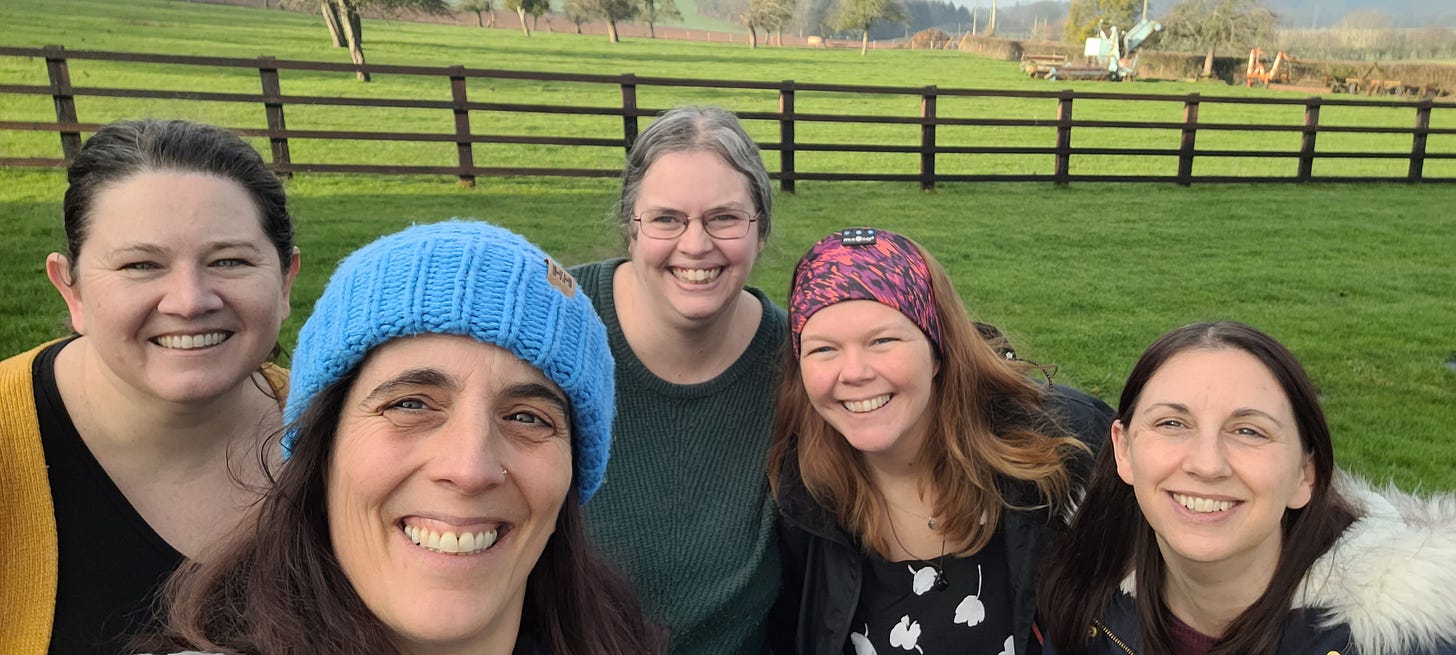After two months of being there—feeling out of place and lonely as a 24-year-old single mother of an 11-month-old baby while spending days in a class of 18-year-old school leavers and nights at home with a sleeping child and a TV—I couldn’t stand it anymore. Sure, I was “only” 35 miles from home, but I may as well have been on the other side of the world.
I missed the friends I could meet for coffee, who I could share a smoke with and put the world to rights, who would invite me for dinner and share bottle after bottle of wine.
I had no idea how to make friends here, amidst the chatter in the college coffee shop. We had nothing in common other than our shared desire to be teachers. I missed my friends. That night, I decided to do something about it.
I bundled L into his coat and strapped him into his pushchair, covering him with a blanket and pulling the rain cover down to shelter him from the November evening. The local shop, just a few minutes walk up the hill from my house, had a good selection of wine. I choose the Shiraz we drank on my last evening with K and R, grabbed some crisps, cigarettes, and papers to make a joint, and headed home.
Tonight I won’t be alone, I thought. Tonight, I’ll drink with my friends.
With L in his sleep suit and tucked into bed, I opened the wine and smiled as the familiar, spicy aroma caressed my nostrils. After pouring my first drink of the night into my favorite mug, I picked up my mobile, and texted R: “I miss you. And tonight, I’m drinking with you. Cheers x”
Tonight, I would drink with my friends even though no one was there.
Tonight, I would cross that line—the one I swore that I wouldn’t.
Tonight, I would drink alone and pretend that I wasn’t.
I drank to hide loneliness and to replace my friends.
That was me 30 years ago. And while it wasn’t the first time I drank alone, it was the first time I consciously drank to replace my friends. It was the first time I drank to hide loneliness.
For five years prior, alcohol had been the oil that smoothed my bewildered efforts to find myself in the world, the people who would accept me, and the place where I could belong.
At 19, I met the group of misfits who would welcome me into their fold and introduce me to binge drinking, weed, LSD, speed, and casual sex. I soon learned that my people drank. My people took drugs. My people were wild and fun and colorful and did things my mother certainly didn’t approve of.
With them, I became all those things. As a painfully shy, weird kid, my attempts to fit in and fade into the background at school had failed miserably. I had spent my whole childhood feeling as though I didn’t belong anywhere. With them, it was different. With them, I belonged.
And when my life fell apart spectacularly at age 20, the drugs and alcohol gave me a way to “cope.” I had lost a profound part of my life and identity, but I could still be Esther the Party Girl.
Wherever I went in the lost years of my early twenties, finding people to get drunk and high with was a way to belong. It didn’t matter if we had nothing else in common. The ragtag group of residents of the bedsit that was supposed to be the start of a new, clean, healthy life for me. The group of hippy musicians who reminded me how much I wanted to be a musician and how much I loved hanging out with musicians (that is, until I had a child with one and realized that living with an unemployed musician is like having a teenager to care for).
But in Swansea, 35 miles from home, newly single after ditching the musician, and trying to make a better life for myself and my baby son, I had never known loneliness like this.
That November night marked a new stage of my addiction. It led me to normalize drinking alone—even when, as years passed and the quantity increased, I would hide it from friends and family. I knew from that first night a line had been crossed. But that was a problem for another day. Meanwhile, the loneliness was overwhelming.
Connection—not drinking—heals loneliness.
Loneliness is a devastating problem that affects more and more people as the world becomes more and more “connected.” The Covid-19 pandemic shone a bright light on the problems that a socially wired species experiences when isolated. We are designed to be social, to connect, to be able to co-regulate our minds and bodies with others. We are not designed to be on our own.
Loneliness, in evolutionary terms, is a death sentence. And while “being thrown out of the tribe” might not mean the same thing now as it did for our ancestors, lack of belonging and connection causes very real, life-threatening harm. Our nervous systems need the co-regulation that other people offer us. We need support, companionship, and the sense that we are accepted and belong. Without these things, we suffer mentally, emotionally, and physically.
Alcohol is sold as a way to connect, lubricate social interactions, and allow us to “let our hair down” and have fun. But the sense of connection we get from alcohol isn’t real connection. If you have to get drunk to enjoy being with friends, then maybe, just maybe, the friendships aren’t as real as you think they are.
When I turned to Shiraz that night in November 1997, I was trying to find the connection I needed. But I wasn’t ever going to find it in a bottle. Not in that one. Not in the countless others over the next 17 years.
The drinking didn’t take away my loneliness that night or future ones. Of course it didn’t! Drinking doesn’t ease loneliness. It merely numbs, obliterates, and hides it from view. And when we numb or hide our loneliness, we make it ever harder to form meaningful connections that don’t depend on us being drunk.
This is why connection and true belonging are a vital aspect of any successful recovery program.
For instance, the CHIME framework for personal recovery places Connectedness at the foreground of its model, which also includes Hope, Identity, Meaning, and Empowerment. Those other pillars can grow from a sense of connectedness and belonging. When we feel accepted and supported by the people around us, we can find hope, we can create a positive self and social identity, we can find meaning and purpose, and we can find the strength and support we need to build our own empowerment.
This is why most successful recovery programs involve a strong element of community support. Whether you turn to fellowships such as AA, Refuge Recovery, recovery communities online, or communities of common interest that support your recovery (such as I found through yoga), having the support of people who accept you as you are is fundamental to recovery.
This sort of support and community is much deeper than surface-level approval or external validation. In the words of Brené Brown:
“Belonging is the innate human desire to be part of something larger than us. Because this yearning is so primal, we often try to acquire it by fitting in and by seeking approval, which are not only hollow substitutes for belonging, but often barriers to it.”1
I’ve been in recovery for almost 10 years. I’ve spent a lot of that time trying to figure out where I truly belong while learning to belong to myself. I’m still trying, but it’s a lot easier without alcohol getting in my way.
I can know myself, my values, my interests, my emotions. I can tell whether I truly enjoy a place, activity, or person now that I don’t need alcohol to make them more interesting, fun, or bearable.
It’s a great filter for true friendships: realizing whose company you enjoy sober and which friendships mean enough to work on changing them to accommodate your sobriety.
So many people use alcohol the way I did, to enable and enhance social relationships, to relieve loneliness, and to create a feeling of belonging and connection. Those of us lucky enough to escape the spell and find recovery soon learn that connection and belonging are never found through drinking—not on the deep level we actually need.
We are all looking for connection, hope, identity, meaning, and empowerment. We can’t find that in a bottle, but it’s there in abundance when we take steps towards recovery.
Whatever that path looks like for you, whatever your community and place of belonging, I wish you well with all my heart, and I want you to know that you do belong, you are connected, and there is hope.
Your turn!
We’d love for you to share in the comments:
Have you ever turned to alcohol or other drugs in an effort to feel less lonely? Did it work in a deep and lasting way?
Where and how do you find connection and belonging in sobriety? How is it different from what came before?
And if you found this article helpful, please tap the little heart. It lets others know there’s something useful here and will help us grow this community.
Want to be published on Sober.com? If you’re a sober writer, we invite you to contribute! Reach out to hello@danaleighlyons.com for details.
The Gifts of Imperfection: Your Guide to a Wholehearted Life, Brené Brown.






Oof. I really felt this one, Esther. By the time I quit drinking, I was only drinking alone. There was no community, no belonging, and no relief in that. Thank you for sharing, and huge recognition and celebration of your sobriety. ❤️
Oh, I resonate so much with what you share here, Esther. I also remember how it felt when I first started justifying the drinking alone. I even bought myself a wine glass that said, "It's not drinking alone if your dog is there with you." I tried to joke it all away but underneath, there was nothing funny about it. I was lonely and self-medicating so many emotions I was scared to let out. I'm so grateful for finding sobriety.
This line really hit me: " I’ve spent a lot of that time trying to figure out where I truly belong while learning to belong to myself" Belonging to myself - oooof! That's been the game changer for me, too. I now trust myself in ways I never could before.
Great essay!